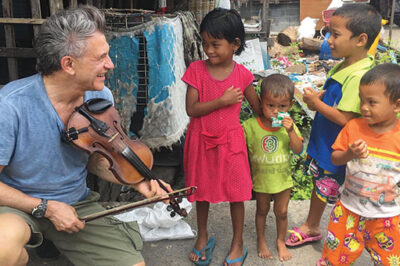A quest for the baptism of the Holy Spirit brought Georgian Banov to a throne room encounter with what he describes as millions of angels swirling and shouting around God’s throne in uncontained joy. And the power of the Spirit ignited within him that day has carried him through Bible school, marriage, an award-winning career in contemporary Christian music and much more.
Banov was 26 years old in 1974 when his new Christian friends from California’s Jesus Movement stood around him, praying for the baptism of the Holy Spirit.
As they prayed, Banov received a vision. He stood at the edge of the throne room in heaven and heard a roar of celebration, like a football stadium of cheering fans. To his amazement, the throne was completely covered with angels, who shook as rays of light injected them. Unexpectedly, a ray of power passed between the cluster of angels and struck Banov.
“It felt hot, and it felt like love,” Banov says. “After the second one, I got overheated. I didn’t think I could handle a third one.”
When Banov came out of the vision, he immediately turned to his friend Bob, who had led him to the Lord two weeks before. He exclaimed, “Bob, I love you! I mean, I love you!”
Only God understood how desperately Banov needed to experience God’s love—and only God could heal the empty ache inside his soul.
Beginning in Bulgaria
In 1944, four years before Banov was born, communists invaded his native Bulgaria. Business owners were accused of being abhorrent capitalists—the enemies of socialism—and were subsequently arrested and jailed. Those who resisted the confiscation of their private property were executed. Incredibly, the dictator of the Union of Soviet Socialist Republics, Joseph Stalin, ordered people to be shot on sight if they wore reading glasses. Citizens were burned alive in the ditches they dug themselves after communist soldiers poured gasoline on them.
Banov was only 4 years old when his parents divorced. His father never came to see him, and that rejection devastated his tender young heart.
Banov’s mother struggled to make ends meet. The two never lived in a home by themselves but rented a room with other tenants. He and his mother moved 15 times during his childhood. His loneliness intensified when his mother insisted he practice his violin after school and did not allow him to go outside to play ball with his friends. Day after day, he suffered deep inner darkness and social isolation.
In first grade, Banov and his friends each received a red scarf to wear to school every day, identifying them as students of socialism under Joseph Stalin. Later, in high school, blue scarves replaced the red ones. School officials required him to classify himself as a communist, not a Banov, mandating the memorization and declaration of communist propaganda. He and his classmates were marched to the public square, ordered to turn and raise a hand salute to the communist leaders while shouting, “Glory to the Communist party.”
“They talk, and we listen,” Banov says of his teachers. “There is no place to think or speak. Our teachers told us that [the late] Vladimir Lenin was our father.”
Outside the classroom, bread, cheese and vodka were rationed daily. The liquor industry financed the salary of the Communist Party. Banov said that by 6 o’clock each evening most males in Sofia, Bulgaria, were drunk—the goal of the Communist Party, because drunks can’t fight.
“A refrigerator did not exist,” Banov says. “There was nothing to refrigerate. A slab of meat may arrive once a week—half a pound for a whole family. Quickly we line up, get a portion, go home and cook it, and that’s it.”
“Communism is a futuristic society, and it never really happened,” Banov explains. “The communists’ end goal was to create a master race that would enjoy a heavenly paradise without God. The interim season between leaving the detested capitalism and obtaining the communist utopia is called ‘socialism.’ Socialism is extremely violent in its mission to kill and dispose of all human beings who were not born into its ideal master race.”
In Bulgaria as well as in communist Russia and China, the state view of religion echoed Karl Marx’s famous words: “Religion is the opiate of the masses.”
“Everybody mocked Christianity,” Banov says. “Socialists said Christianity is for dumb, very old, superstitious people.”
Banov recalls seeing new monuments erected of women who looked like men and dressed like men. Mothers were told their value was not in the home but as common laborers in the workplace. Children under 5 were herded into large day care centers each day. Communism identified its citizens as the working class of the socialist party, not families made up of parents and children. Banov sees the same pattern emerging in America today.
“After God himself, family is the second most dreaded thing by leftists in America right now,” Banov says. “There is an attack on the family, to destroy the family.”
Banov appeals to today’s Christians to return to their first love for Jesus. “In my opinion, we are semi-backslidden,” he says. “We have become comfortable with the secular culture around us. Christianity is being in love with Jesus—in love with Him, loyal to Him, more connected and more loyal to Jesus than anything. Unless your repentance takes you back to your first love, it is not repentance. We have to realign and be loyal to the Lord within our hearts, families and relationships in order for the culture of heaven to become vibrant again.”
Moving Toward Freedom
The summers Banov spent at his maternal grandparents’ home just outside the city of Sofia provided his one respite from school and social isolation. International newscasts were strictly forbidden, but in his teen years during the ’60s, he often sneaked downstairs after everyone was asleep so he could listen to his grandfather’s shortwave radio. A new kind of music broadcast from the United States thrilled him: rock’n’roll by the Beatles.
In time, Banov invited three friends to listen with him, and together, the boys formed the very first rock’n’roll band in their nation, The Silver Bracelets. The band’s new, fresh sound strongly resembled the Beatles’. In time, the boys gathered the courage to request permission to play on Bulgaria’s one and only television station. After a wait, the government granted them that permission, but they could play only soft folk music.
The Silver Bracelets exploded into instant fame. They held concerts outside the television station, and when the communists saw the nation’s teenagers flocking in, they banned the group from all public performances. Incited by the lockdown, Banov determined that one day, he would escape communism once and for all.
During the next few years, he served in the Bulgarian army and went to college. All the while, he dreamed of the day he would leave his nation and enter the free world. Even the idea of escape carried stress in a society that would doubtless kill him if he were caught.
More frightened than he’d ever been, Banov obtained a travel visa, and he and a musician friend secretly fled Bulgaria. But one embassy after another refused to aid the young refugees. The last place they expected to find help was the U.S. Embassy. Both boys had been indoctrinated with the idea that capitalism was evil and Americans were their worst enemies.
Banov was shocked at the response they received. When the U.S. consulate heard their escape story, he stood up, opened his arms and said, “Welcome to America, boys. We like your kind. You risked your lives for freedom, and that is what America is built on: immigrants just like you.”
Before Banov knew it, he was on a plane headed for New York. For the first time in his life, he was free.
Once in America, Banov picked up one odd job after another to earn enough money to make his way to California. There, he hoped to encounter the rock’n’roll that had so enamored him in Bulgaria. He was disappointed to find Hollywood steeped in drugs, prostitution and alcohol. In time, he encountered a group of young men from the Jesus people who witnessed to him. Once he was born again, they encouraged him to seek the baptism of the Holy Spirit.
“There’s more, Georgian!” they told him excitedly. “There’s more!”
After his throne room encounter, Banov found Psalm 16:11b: “in Your presence is fullness of joy; at Your right hand there are pleasures for evermore.” He now knew God’s joy was real. But how would he ever empty his soul of the brainwashing the socialists had poured into him?
Sharing in Joy
Banov got a job making pizza and popcorn at a theater, which gave him just enough money to live on as he sought God in his apartment. Outside of work and daily necessities, he spent all his spare time poring over Scripture. As he read the Bible, he related to Abraham because, like him, Abraham was a stranger in a new country. He understood Joseph, born into a dysfunctional family and separated from them, just as Banov had been separated from his family except his mother since age 4. The Bible became part of him, and he memorized whole sections of it. Looking back, he sees this one-year period as the foundation of his faith.
At a meeting hosted by Winkie Pratney, Banov was invited to attend a Bible school, where he often skipped supper to walk and pray. Here, he also met his future wife, Winnie.
“What attracted me to Winnie were the night prayers,” Banov says. “At 10 o’clock at night, as I was walking and praying, I’d see her in the woods praying.”
At Bible school, the two first began to work on children’s songs together, so they could minister to the children from the surrounding poor neighborhoods. After their graduation and ordination, they married and yielded their lives to the ministry.
Together, the couple co-wrote a series of children’s albums, including Bullfrogs and Butterflies and Music Machine, selling more than 3.5 million copies and earning several Dove Awards and Grammy nominations.
Desiring to minister to adults as well, the two led a popular Christian band of the ’70s and ’80s called Silverwind. Georgian gave his testimony and the altar call at the close of their concerts. During this time of touring with Silverwind, their daughter, Yana, was born.
Although tens of thousands were saved at the stateside concerts, Georgian longed for the mission field. He shared his passion with the other band members. Everyone agreed, and Silverwind traveled to Kenya, Uganda, South Africa, Poland, Germany, France and Holland. When the band went back on tour in the United States, God tugged on the Banovs’ hearts that it was time to leave Silverwind.
In the summer of 1989, God spoke clearly to Georgian that it was time to go home to Bulgaria. Even though they knew he was a wanted man in Bulgaria, the Banovs believed God would protect them if they returned. They had already purchased their tickets when communism collapsed later that year. Georgian’s mother and grandmother greeted him, Winnie and their daughter, Yana. To his utter amazement, on the other side of the arrival gate, his father and his second family stood waiting to greet them!
Bulgarians everywhere were rejoicing over their freedom from the communist government. To Georgian, it compared to Esther 8:15b (NKJV) when “the city of Shushan rejoiced and was glad,” after Queen Esther saved the Jews from annihilation. Georgian found his old rock’n’roll friends and witnessed to them. He received instant invitations to take the stage in city centers, marketplaces and stadiums, where soul-hungry Bulgarians yearned to hear about life in the free world. Of course, his message was that freedom could only be found and maintained in Jesus Christ.
While in Bulgaria, Georgian’s family stayed with his mother, but they had dinner with his father and his family, and his father came to each of Georgian’s son’s evangelistic meetings. He sat on the front row and went forward for every altar call. In time, both Georgian’s parents and his grandmother were born again.
Souls everywhere were ripe for the harvest, and pastors cried out, “We need Bibles!” Bulgarian pastors wept, and some kissed his hand as Georgian met with them and passed out new Bibles in the Bulgarian language.
Serving in Love
Back in the United States, God enlarged the Banovs’ hearts as to what evangelism could look like, wrapped up in a biblical parable. Just as the father ran to meet his returning prodigal son, they ran to meet the lost. Their hearts laid hold of the “joy in heaven over one sinner who repents” (Luke 15:7b, MEV), and they took on the new ministry name of Global Celebration. Today they go to the poor, the outcast and developing nations to initiate what they call “the fattened calf celebrations.” Their evangelistic efforts look like huge block parties. People come from miles around to feast and celebrate. The poorest of the poor are welcomed with prayer, hugs and the gospel of Jesus Christ.
“Underneath joy is love,” Georgian says. “The fruit of the Spirit is love and then joy. The basis, fiber and structure of joy is love.”
Back home in Harrisburg, Pennsylvania, the Banovs started Global Celebration School of Supernatural Ministry (gcssm.org), a nine-month online interactive school. New classes begin on Aug. 17, 2021, with the goal of training believers in their identity and how to minister in the supernatural.
But God continues to call Georgian to more.
God revealed to him while prayer-walking in Bible school as a young man that his greatest evangelism adventure would occur later in life. Georgian was divinely transported to a large stadium where he stood on the platform and declared the goodness and wonders of God. To his amazement, he saw the cloud of the glory of God descend slowly, beginning from the top row of the stadium. It continued section by section until it reached the floor of the arena and then the stage.
“Nothing has even come close to that impact that I experienced on that futuristic stage,” Georgian says. “The enemy is going after our next generation. He wants our children and our children’s children. This is harvest time, but we cannot be fearful. Gideon was hiding his harvest. He was scared to death. Then the Spirit of the Lord came on him, and 30,000 people came out of caves—because his leadership drew them out of their fear. The message of this harvest is to stand against fear and declare God is coming, and His harvest is coming—to America and the world!”
READ MORE: Learn about evangelistic efforts across the globe at gospel.charismamag.com.
C. Hope Flinchbaugh has written more than 250 stories for preschool, kindergarten, first- and second-grade school readers for the Association of Christian Schools International. The author of three novels and two nonfiction books, all traditionally published, she has also written more than 75 magazine articles for children and adults.
This article was excerpted from the August issue of Charisma magazine. If you don’t subscribe to Charisma, click here to get every issue delivered to your mailbox. During this time of change, your subscription is a vote of confidence for the kind of Spirit-filled content we offer. In the same way you would support a ministry with a donation, subscribing is your way to support Charisma. Also, we encourage you to give gift subscriptions at shop.charismamag.com, and share our articles on social media.







Leave a Comment
You must be logged in to post a comment.